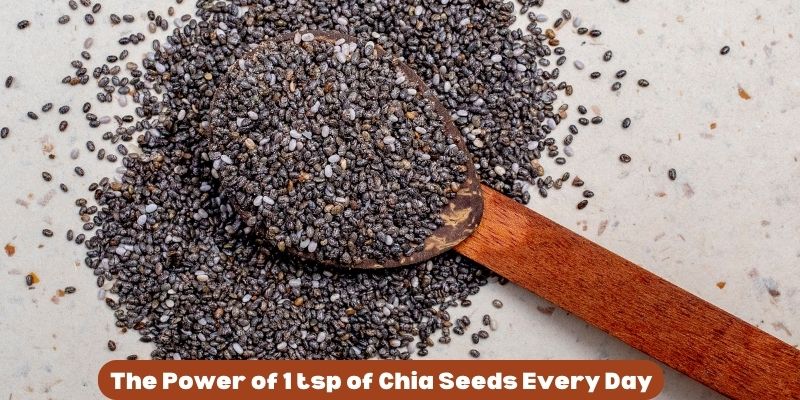In the world of superfoods, there’s one tiny seed that’s been making a big impact – chia seeds. Packed with nutrients and boasting an impressive array of health benefits, chia seeds have gained significant attention as a nutritional powerhouse. Incorporating just 1 teaspoon of chia seeds into your daily routine can lead to a host of positive changes for your overall well-being. Let’s discuss the power of 1 tsp of Chia seeds every day.
Nutritional Profile of Chia Seeds
Chia seeds, derived from the plant Salvia hispanica, have been cultivated for centuries and were a staple in the diets of ancient civilizations. Despite their minuscule size, chia seeds are a nutritional powerhouse. They are rich in essential nutrients, including fiber, protein, healthy fats, vitamins, and minerals. This combination of nutrients contributes to their impressive health benefits.
1. A Fiber Boost for Digestive Health
One of the standout features of chia seeds is their exceptional fiber content. Just one teaspoon of chia seeds contains around 5 grams of dietary fiber, which is crucial for maintaining a healthy digestive system. Fiber promotes regular bowel movements, prevents constipation, and supports the growth of beneficial gut bacteria. Including chia seeds in your diet can help regulate digestion and contribute to a healthier gut.
2. Omega-3 Fatty Acids for Heart Health
Chia seeds are an excellent source of alpha-linolenic acid (ALA), a type of omega-3 fatty acid. These fatty acids are known for their heart-protective effects, including reducing inflammation, improving cholesterol levels, and supporting overall cardiovascular health. Incorporating chia seeds into your daily routine can be a heart-smart choice, even in such small quantities.
3. Plant-Based Protein for Sustained Energy
For those following a plant-based diet or simply looking to boost their protein intake, chia seeds offer a convenient solution. With about 2 grams of protein per teaspoon, these tiny seeds can contribute to your daily protein needs. Protein is essential for muscle repair, immune function, and the production of enzymes and hormones, making chia seeds a valuable addition to any diet.
4. Antioxidants for Cellular Protection
Chia seeds are also rich in antioxidants, which play a crucial role in protecting cells from oxidative stress and damage caused by harmful free radicals. Antioxidants contribute to overall health and can potentially lower the risk of chronic diseases, including certain types of cancers and heart disease. By consuming chia seeds regularly, you’re giving your body an extra dose of natural protection.
5. Weight Management and Satiety
If you are aiming to manage your weight, chia seeds can be a helpful tool. Due to their high fiber and protein content, these seeds can help increase feelings of fullness and satiety, potentially reducing overall calorie intake. When consumed with liquid, chia seeds swell and form a gel-like substance, which can slow down the digestion process and help control appetite.
Incorporating Chia Seeds into Your Diet
Incorporating chia seeds into your daily routine is remarkably simple. You can sprinkle them onto yogurt, oatmeal, or smoothie bowls, mix them into baked goods, or even create a refreshing chia seed pudding by soaking them in a liquid of your choice. The gel-like texture that forms when chia seeds are soaked adds a unique element to your culinary creations.
Conclusion
Nature often hides potent benefits within the tiniest of packages, and chia seeds exemplify this phenomenon. Just 1 teaspoon of these remarkable seeds can contribute to better digestion, heart health, weight management, and overall well-being. With their impressive nutritional profile, chia seeds have rightfully earned their place among the ranks of superfoods. So, consider adding this simple yet powerful ingredient to your daily routine and experience the remarkable difference it can make for your health.
Remember, before making significant changes to your diet, it’s always a good idea to consult with a healthcare professional, especially if you have any underlying health conditions or allergies.
You may also like:
Best Time to Drink Chia Seeds for Weight Loss
Chia Seeds Side Effects in Females
FAQs
Q:- How much chia seeds should I consume daily?
Ans:- Including just 1 teaspoon of chia seeds in your daily diet can provide you with a significant dose of nutrients and health benefits. However, you can gradually increase the amount if desired. Remember that chia seeds can absorb liquid and expand, so it’s essential to stay hydrated when consuming them.
Q:- Can chia seeds help with weight loss?
Ans:- Yes, chia seeds can contribute to weight management due to their high fiber and protein content. The combination of these nutrients can help you feel fuller for longer, potentially reducing overeating and aiding in weight loss efforts.
Q:- Can I eat chia seeds dry, or should I soak them first?
Ans:- While you can consume chia seeds dry, soaking them is recommended for several reasons. When soaked, chia seeds develop a gel-like texture that can be more pleasant to eat. Additionally, soaked chia seeds are easier to digest and their nutrients become more bioavailable.
Q:- Are chia seeds suitable for people with gluten intolerance or celiac disease?
Ans:- Yes, chia seeds are naturally gluten-free, making them an excellent option for individuals with gluten intolerance or celiac disease. However, it’s essential to ensure that the chia seeds are not cross-contaminated during processing or packaging.
Q:- Can I eat chia seeds if I have nut allergies?
Ans:- Chia seeds are not tree nuts; they are seeds from a plant related to mint. Therefore, chia seeds are generally safe for individuals with nut allergies. However, as with any dietary change, it’s recommended to monitor your body’s reaction when introducing chia seeds into your diet.
